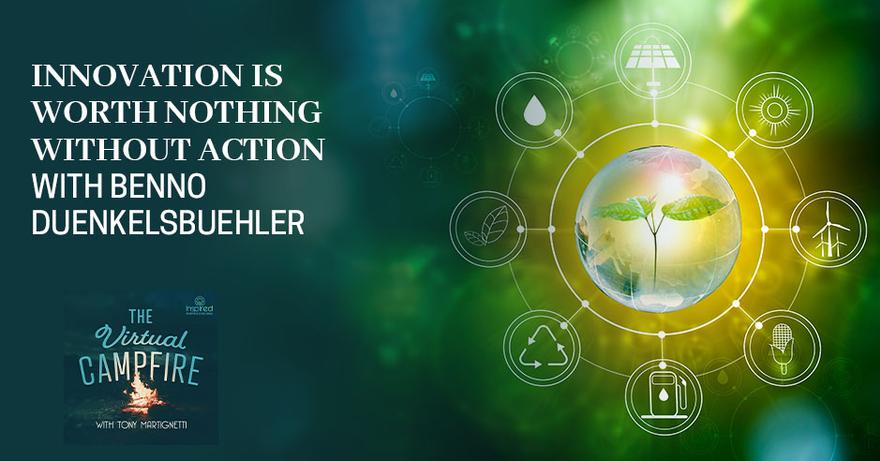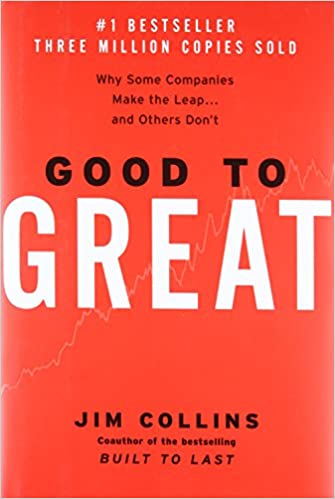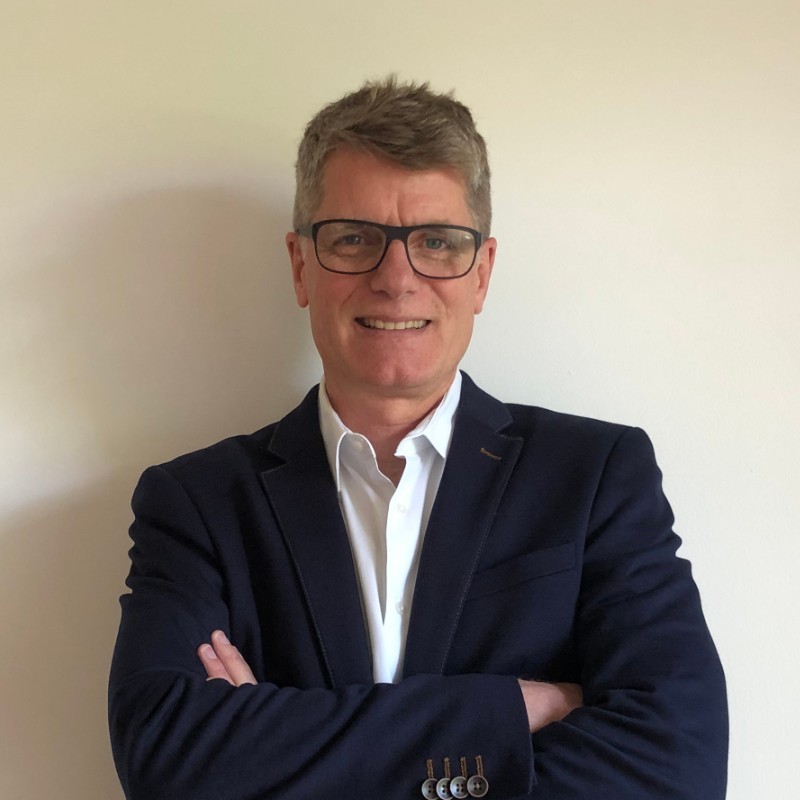Innovation Is Worth Nothing Without Action With Benno Duenkelsbuehler

Innovation is great. But who cares about it when you don’t turn it into action? The show’s guest today is Benno Duenkelsbuehler, the Chief Growth Sherpa/CEO of (re)ALIGN. Benno shares with Tony Martignetti how his biggest pivotal moment was moving to America with his family. When founding his business, his senior warned him against analysis paralysis. Go and find your client. They will tell you what your business will be about. In the end, ideas are nothing without action. Join in!
---
Listen to the podcast here:
Innovation Is Worth Nothing Without Action With Benno Duenkelsbuehler
It is my honor to introduce you to my guest, Benno Duenkelsbuehler. Benno is the Founder and Chief Sherpa of reALIGN Expansion Sherpas, a growth agency he founded in 2009. He's the host of Third Growth Option Podcast, which is amazing. His team of Sherpas helps manufacturers and distributors to break through growth ceilings to solve revenue problems in a very execution-driven way, adding 7- to 8-figure revenue streams. He lives in Cincinnati and Mexico City with his wife and two lovely daughters, who keep him on his toes. I want to welcome you to show, Benno.
Thank you so much, Tony, for having me. I'm looking forward to this.
I'm so looking forward to having you on and I got to give myself a little pat on the back because your name is quite a mouthful. You're going to have to share with people where you're from originally and where that name comes from. It's amazing.
Usually, when immigrants come to the United States, their names get sensibly chopped in half and ours turned a 13-letter last name into a 15-letter last name. We came from Germany in 1980, my parents and I. My parents have the crazy idea of solving their midlife crisis by starting a venison farm in America, in upstate New York, in the Finger Lakes. Did I answer your question?
We may end up spending some time talking about your journey from Germany here, but the name is such an amazing name. It's something that is not as common here. Maybe my name's not so common either, but I wanted to share where that comes from. I'm so thrilled to have you on the show. I can't wait to dig in and reveal the journey that brought you to where you are, making such a big impact in the world. What we do in the show is reveal the story through what's called flashpoints, the points in your story that have ignited your gifts into the world. As we're telling your story, pause along the way and let's see what's showing up. With that, I'd like to turn it over to you and you can start wherever you're called to start. What was the first flashpoint in your life?
The first biggest flashpoint must have been my parents returning from a trip to the United States back to Germany where I grew up and where I was at the time when they returned and my parents announcing that we're moving to America. That would've been a flashpoint. It was a month before I turned sixteen. I was having a moment like, "What do you mean we're moving to America?" That's the age when you've started to hang out with your group of friends and the early parts of figuring out who you might become as an adult.
The worst thing that could happen is to stop growing.
They gave me the proverbial choice, "You can come with us to the States for a year. We'll figure it out together. It'll be like an exchange student year. You'll learn a new language and the culture. It will be good for you. The other choice that you can stay in Germany and go to boarding school." I was like, "Fine." That was not a choice because who wants to go to boarding school? That was definitely a flashpoint where I chose to go with my parents to the US and they were in the process of building an organic venison farm. I didn't speak English. I had a couple of years of high school English and it was a life-changing event because I was surrounded by people who think, live, and work differently, speak a different language, and I learned a lot from them. Everything that you take for granted is being called into question and that's scary. Hence, a super healthy way to become alert and then stay alert.
It's a massive disruption, but a healthy disruption that allows you to reframe your thinking a little bit and say, "Maybe this will open up new ways for me to look at life, maybe new ways to approach things." When you moved from Germany, were you in a rural place, city, or what was it like? Where'd you come from in Germany?
For Germany, it was a mid-sized town, like 70,000 or 80,000 people, which in the US is a small town, but it's the equivalent of 500,000 to 1 million population city in the US, relative to the rest of that country.
I was curious as to how much of a disruption this truly was, besides the language and culture.
I grew up in Konstanz, the name of the town which is in Southern Germany, and it's this beautiful, picturesque university town with buildings dating to the 1300s. From there, I went to live in New Hope, New York, which is probably eight people in the middle of the day and the school was twelve miles down the street. There were 1,000 people in that little town. To me, it was like landing on the moon. It was out in the middle of the country and the next university was maybe an hour's drive by car.
What happens with a young man who comes to America and what did you do to create the next step for you?

My parents had framed it as a year abroad. They were moving to America for at least 10 or 20 years. They were in their early 50s. They'd lived there for many years. My dad passed away and my mom is still in upstate New York. It called everything into question. I'm living on a farm, learning a new language, being surrounded by people that have a completely different way of looking at the world and life than this picturesque medieval university town in the south of Germany. Here I am in rural America on a farm, twelve miles from the next traffic light. That is a disruptive experience.
What did you yearn for next? What called you to shift from that moment of being in that place? What did you do next in your journey?
My parents had framed it as a one-year trial. I was like, "Let me jump in with both feet and embrace everything." I attempted to become more American than all the Americans around me. I was wearing jeans and baseball caps and driving a pickup truck with dual mufflers because it's out in the country. I wanted to out-Americanize the Americans. Eleven months into that year, I was like, "This is a pretty cool country. If I go back to Germany, I know exactly what awaits me." It was like finish high school and then go to university like your four older siblings. Whereas staying in the US was like, "I don’t know what I'm going to do.” This is interesting. I ended up going to a community college for a couple of years to figure out what I was interested in and then I graduated from Cornell University at the end.
The next flashpoint came in my second big job. I spent the first ten years in a retail career with Conran's Habitat in Manhattan for a couple of years and then with IKEA for years, which I consider as my first big job. My second big job was as a buyer at Pottery Barn in San Francisco, where I again had to relearn everything I had learned at IKEA, which is a huge international conglomerate of low-priced furnishings and then going into a small, specialty retailer with at the time. It had 40 stores or something called Pottery Barn. The way they ran the business and thought about specialty retail was a complete reverse of what I had learned at IKEA, which is why I went to Pottery Barn because I wanted to learn something completely different. The third big flashpoint was falling in love with a beautiful Mexican woman. On a short buying trip from San Francisco to Mexico City and on the way back, she and her family were on the airplane. We ended up meeting, chatting, dating, and marrying all within the first eight months of that.
I have to pause for a moment to say your life seems to be an endless journey of sharp contrast between somewhat established to rural, moving from Germany to the US. You brushed past it but community college to Cornell, and then going from IKEA to Pottery Barn. These things seem like that's something that you navigate, those sharp contrast with ease.
I love those sharp contrast because, to me, the worst thing is to stop growing, to become stagnant and complacent, and to no longer question whatever thing I learned yesterday, 10 years ago, or 30 years ago. When you stop questioning, then you stop growing. When you stop growing, you stop living, as far as I'm concerned. To me, growth is something that I embrace with every fiber of my body, that being married and a German who lived in the US for 2/3 of my life, who married a lawyer from Mexico City years ago and we spend holidays in Mexico City during Christmases. We bought a penthouse in downtown Mexico City because I was like, "I want to get to know the Mexican culture." Being a property owner in a place, there's no way to embrace it than owning property there. To me, being stagnant and taking things for granted, that's the way we've always done it. That thinking is a death spiral. I can't live that way and it's probably because they shook my bottle when I was sixteen.
Innovation is great, but if you don’t execute it, who cares?
That's why I love when people start their stories with the early days of their life because there's an element of, we start the transformation starts early and we start to go on this path that puts us on the trajectory of becoming who we are. We have different turns and pivots along the way, but ultimately it puts us in this journey that we ultimately end up where we are. It's interesting that all seems to have played out. All these extremes or these contrasts have been showing up for you started from that point. What I want to know now is, what brought you to the business you're doing? You had experience with the retail space and a very interesting experience, but what brought you into doing your own business?
I've always dreamed of becoming an entrepreneur, but I didn't have maybe the self-confidence in my 20s and 30s and the guts. I felt like I should learn as an employee in my 20s and 30s, and early 40s even. I went from years on the retail side to the years being a head merchant or CEO of wholesale companies, manufacturers and distributors selling to retailers, and so I always wanted to have my own business. When I started my own company, reALIGN Expansion Sherpa, I loved the idea of helping owners or executives of wholesale, manufacturing or distribution companies break through some growth ceiling. Sometimes it's a 10- or 20-year-old company or a 50-year-old company that is in the 2nd or 3rd generation of the business. What got them here isn't going to get them there.
I love working with owners and executives and learning what got you here, where do you want to go, and how we can help break through that growth ceiling by doing something that is organic enough where it's related to the core business. Keep doing what you've always been doing better and faster. We help companies go into new adjacent product categories, help them break into a new channel of distribution, or sometimes sharpen the go-to-market of the core business but with that thinking of, "What if we did it a little bit differently?" Our business operates at the intersection of innovation and execution. Innovation is great. You got to think of new ways and highways to do it, but then if you don't execute it, who cares? That's why we call ourselves Sherpa. It's like, "We're going to help you think of a way to pivot or get into this adjacent product category and we'll help you execute it."
There's this follow-through that is so important. Not to discount the consulting field, but there's an element of consultants who come in and say, "This is what you should do. I'll cut my paycheck and then I'll walk out and leave it to you to do that." If you are walking alongside them and helping them to see that, you're not just going to drop it in their lap and say, "I'll see you later," but instead, help them to see it through. That makes a big difference in how things get done. It's the execution that's important. You wouldn't sell them some fake plan.
Maybe this applies to a big chunk of consultants, but there are some very capable consultants out there that this does not apply to, but too many of them tell you what you already knew using bigger words and then walk away when it comes to, "We don't execute that." I think that's dangerous because then the owner or the executive is left with a consultant's business plan that they don't have time to execute. I tell people that the biggest problem we solve is that you cannot run a business and build a business at the same time with the same resources. Consultants don't solve that problem. They tell you how to build a new business, but they don't actually do it. There's no time to run and build at the same time with the same people.
Tell me some of the stumbles along the way as you created that business. It's not just the business and you're not just in Cincinnati. You're all over the place. What were the early challenges that you faced as you started this business?

At the very beginning years ago, when I hung out my shingle, as they say, the challenge was to pick a lane because you're like, "I've done a lot of things in my career and I can help you with all these different things," and that nobody can wrap their mind around that. The biggest challenge was to focus. I had a colleague, a friend of mine, who did me a great favor. This was in the first months as an entrepreneur. He says, "Benno, let me gather a handful of people for lunch and I'm going to ask that handful of people to talk about your business, your capabilities and give therapy to you." One of the handful of people, Mike Sipple, Sr., I forget his exact words, but he said, "Don't spend the next months trying to figure out what your business is. Spend the next months trying to get some clients, even if you're all over the place and you think you can be everything to everybody. That's okay. Get a good client. They will tell you who you are or what you're good at."
My first big client was a lighting company that wanted to get into a new adjacent product category called furniture. They have 1,000 different ideas of how to do that, but they couldn't execute 1,000 different ideas. They have to pick 1 or 2, and they allowed me and put me in charge of figuring that out for them. I did that for three years. Year one, we figured out what kind of new business it should be. What type of product should it be? What type of customers should we go after? We did some test marketing and some sourcing. In year one, we got them from zero to $3 million worth of new revenues in this adjacent category, which is a rounding error on that. It was like $100 to $150 million revenue company. In year two, we had a different set of challenges. We had to bring 2nd and 3rd generation new products to market. I had to bring in new people and got it from $3 million to $10 million of revenue. It's like, "We're onto something here."
In the third year, everybody was on board except for the CFO. We said, "We could double it again from $10 to $20 million." The CFO was like, "Sure you can. All you people say that." The challenge in the third year became making best friends with the CFO or making him comfortable and confident is maybe a better way of putting it. The way we did that was to bring together the demand planning and the supply planning together. There are the salespeople talking about demand planning and then there are inventory people talking about supply planning. They speak different languages. They're from Mars and from Venus.
Bringing those two groups together, the demand side and the supply side, in a systematic way, helped us get from $10 million to $26 million worth of revenues. It's not forecast or whatever but shipped $26 million worth of product on the third year. Lo and behold, my friend, Mike Sipple, Sr. who had said, "Get a customer and let them figure it out," That customer figured it out for me. That became the third growth option and the word Sherpa came up. I came across that doing something on their behalf.
I even think about the word realign is such an important part of what you did. You got them to realign with themselves around a common mission. They come together on the same thing to realign on what it is that they're going to do together because when you have people on different pages, they have to come together and say, "We're going to be doing this. This is the new goal that we've committed to." Your company name is perfect for what you do.
I came up with them. Thank you for saying that because I liked the word realign, my company name because I love the idea of the analytical, meeting the creative, and the left brain meeting the right brain. That's what new business building is about. You got to be left brain and right brain about it, creative and analytical, idea-driven and executing it. Ideas are cheap, but ideas executed are worth a lot.
There’s value in bringing in outside perspectives.
This brings us to this place where you're constantly able to play well in that execution, but also idea generation, two contrasting worlds that you've been able to excel in both. I love the stories you've shared and the insights that are hidden throughout that have been weaved within this story. You've been amazing. When you look back and you think about your journey to getting here, what are a few things that you've learned about yourself that you haven't shared already and you want to share?
I love new ideas, reading, talking to people, stimulation about new ideas, and a new way of thinking and doing. To me, the most exciting way to spend time in a business environment is to combine the 30,000-foot view thinking, go up to the mountain top and think in a grand scale and grandiose way, and combining that with the pedestrian execution one step at a time and get it done. It's great to read books and have lovely conversations with intelligent, brilliant people, but if no action comes from that, then I find it less exciting.
Something about that that speaks to oftentimes we get so caught up in the strategy. It's the sexy part of business, but in reality, there's the stuff that needs to get done. Sometimes you have to hunker down and focus on the things that have to be executed on once you've aligned that strategy. Now, it's about executing and sometimes that execution takes a bit of time before it actually starts to prove itself out.
In business, executives are very used to thinking about the execution, being execution-driven in running the business. When it comes to ideation and a $5 million revenue company thinking like a $20 million revenue company or $100 and $200 million revenue company, they stay up in the clouds. It feels so theoretical and then there's this grandiose consultant thinking that uses big words and intimidates everybody, but I'm saying, "Think big and about doubling or tripling your company size, profitability." Maybe it's not even about top-line financial metrics. Maybe it's about building a great culture and having your team and your employees, instead of being uninvolved bystanders, be completely bought in and love what you do. That requires big thinking and breaking it down into different parts to take one step at a time to get to the moon. You can get to the moon, but you need to break that down. It's not the vision statement that got Apollo 13 to the moon.
I keep thinking of this if it's a quote or not, but it's this element of like having your eyes to the sky and your feet on the ground. This feeling of being grounded, reality, and connected with what's happening, but also always be thinking what's on the horizon, what's happening, and what could be possible. I'm drawn in by what you do and how you've been able to bring this together. I want to ask one last question of you. What is a book that has had an impact on you and why?
I started reading again, maybe in my mid-30s or so. I'm not a huge reader, but I like business. I love Good to Great by James Collins. I read by Adam Grant, Think Again, which is all about always realigning, relearning, rethinking, and think again. As we grow in life, we embrace the learnings from yesterday and then get calcified sometimes. We hold on to that thing that we learned yesterday or years ago. That made us comfortable and that lesson might have helped us a number of times, so we hold on to it, but you've got to be open to think again.
 Part of that is my immigrant experience. As a sixteen-year-old German kid moving to a farm in America and then a few years later going to Cornell University, it was a completely different environment than driving the pickup truck and wearing the Timberland boots on the farm. Buying a penthouse in Mexico City as a second office and residence in addition to our place in Cincinnati was a way to think again and take lessons from the first years of my life. When we're in Mexico City, that shakes my bottle pretty seriously because I'm in the early stages of learning Spanish. My wife has spoiled me relentlessly for years speaking English with me and the other 22 million people in Mexico City don't feel the same way.
Part of that is my immigrant experience. As a sixteen-year-old German kid moving to a farm in America and then a few years later going to Cornell University, it was a completely different environment than driving the pickup truck and wearing the Timberland boots on the farm. Buying a penthouse in Mexico City as a second office and residence in addition to our place in Cincinnati was a way to think again and take lessons from the first years of my life. When we're in Mexico City, that shakes my bottle pretty seriously because I'm in the early stages of learning Spanish. My wife has spoiled me relentlessly for years speaking English with me and the other 22 million people in Mexico City don't feel the same way.
Learning a language is always a great way to think again because language influences how we process idea. When I think about something in English, it's different from the way I think about it in German. It's different from the way about it in Spanish. That's a good way to stay on your feet because language calcifies thought as well. It's an infrastructure in a highway system that goes certain ways. Some languages are more interstate and other languages or more little walking paths through the jungle.
I love that you brought this book in because, first of all, it's a fantastic book. It is when you start to use this thinking this methodology of walking through life, let's call it, it allows you to unlock that next level in your business and whatever you're trying to do, which is awesome. This is where you can change the game. It's by allowing yourself not to get too attached to any of your assumptions of the way things are.
I see so many business owners and executives holding on the old, "What got you here isn't going to get you there." They're holding on to what got them there and here. The value of bringing an outside perspective, be it a consultant, Sherpa, you, me, or somebody else, is that you bring in somebody to shine a spotlight on stuff that has lived in the cover of darkness for too long. Unlike a consultant who tells you, "You got a problem. I hope that works out for you. Here's how you solve it. I hope you can do it," a Sherpa helps you climb that mountain and help you pitch the tent at night, then cook and make coffee in the morning. They keep you going up the mountain because it's scary to climb to the next mountain top.
We're speaking my language. My book is called Climbing the Right Mountain. I'm all about climbing, so I feel that. I can't thank you enough for bringing yourself to the space and sharing your stories. I feel like we've been on quite a journey here. Thank you so much for coming to the show. This has been amazing.
Thank you, Tony. I always enjoy our conversations and I got to read your book.
Thank you so much. It's always a pleasure. I want to make sure that people know where they can find you. What's the best place for people to reach out and find out more about you and your company?
The best way is probably just to go on our website, RealignForResults.com. It's Benno@RealignForResults.com. I always love talking, meeting new people, and see how we can help.
Thank you so much again and thanks to the readers for coming on the journey. That's a wrap.
Thank you, Tony.
Important Links:
- reALIGN Expansion Sherpas
- Third Growth Option Podcast
- Good to Great
- Think Again
- Climbing the Right Mountain
- Benno@RealignForResults.com
About Benno Duenkelsbuehler
 GROWTH SHERPA/CEO – developed the Third Growth Option, faster than internal organic growth and less risky than acquisition, leading to impressive successes with manufacturers and distributors for whom (re)ALIGN added tens of millions in new profitable revenues.
GROWTH SHERPA/CEO – developed the Third Growth Option, faster than internal organic growth and less risky than acquisition, leading to impressive successes with manufacturers and distributors for whom (re)ALIGN added tens of millions in new profitable revenues.
Customer-centric operator with an intriguing blend of analytical business acumen, creative market savvy, and a very engaging approach that creates significant shareholder value.


0 comments
Leave a comment
Please log in or register to post a comment